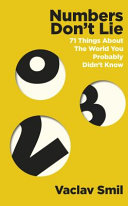
isbn-13: 9780143136224
Paperback
This was a book chosen by another of the multiple book clubs I’m part of at Meta (née Facebook). I’m glad because it was a truly enlightening read. Vaclav Smil uses the numbers and data to reveal a deeper understanding of the state of our world.
There are 71 stories grouped into the following categories: - People: The Inhabitants of Our World - Countries: Nations in the Age of Globalization - Machines, Designs, Devices: Inventions That Made Our Modern World. - Fuels and Electricity: Energizing Our Societies - Transport: How We Get Around - Food: Energizing Ourselves
There are really no boring stories. Here are some excerpts from a few that were particularly memorable:
How sweating improved hunting
It all comes down to sweating. The two large animals we have mainly used for transport perspire profusely compared to other quadrupeds: in one hour, a horse can lose about 100 grams of water per square meter of skin, and a camel can lose up to 250 g/m². However, a human being can easily shed 500 g/m², enough to remove between 550 and 600 watts’ worth of heat. Peak hourly sweating rates can surpass 2 kilograms per square meter, and the highest reported short-term sweating rate is twice that high.
We are the superstars of sweating, and we need to be. An amateur running the marathon at a slow pace will consume energy at a rate of 700-800 watts, and an experienced marathoner who covers the 42.2 kilometers in 2.5 hours will metabolize at a rate of about 1,300 watts.
How many people did it take to build the Great Pyramid?
People are able to convert about 20 percent of food into useful work, and for hard-working men that energy amounts to about 440 kilojoules a day.
Brexit: Realities that matter most will not change
The country’s old-age dependency ratio (number of people 65 and older as a share of all economically active people 20-64 years of age), standing at 32 percent in 2020 – still slightly lower than in France or Germany - will increase to 47% by the year 2050. No government intervention and no declaration of regained sovereignty and severance from the bureaucrats of Brussels will have any effect on this inexorable process.
Given these fundamental realities, a rational observer must wonder what tangible differences, what clear benefits could any reassertion of British insularity bring. False claims can be painted on buses, extravagant promises are easy to make, feelings of pride or satisfaction may become fleetingly convincing - but none of those intangibles can change what the UK has become: an aging nation; a deindustrialized and worn-out country whose per capita GDP is now just over half of the Irish mean (something that Swift, Gladstone, or Churchill would find utterly unfathomable); another has-been power whose claim to uniqueness rests on having too many troubled princes and on exporting costumed TV series set in fading country mansions staffed with too many servants.
Concerns about Japan’s future
In the long run, the fortunes of nations are determined by population trends. Japan is not only the world’s fastest-aging major economy (already every fourth person is older than 65, and by 2050 that share will be nearly 40 percent), its population is also declining. Today’s 127 million will shrink to 97 million by 2050, and forecasts show shortages of the young labor force needed in construction and healthcare. Who will maintain Japan’s extensive and admirably efficient transportation infrastructures? Who will take care of the millions of old people? By 2050, people above the age of 8o will outnumber the children.
Publisher’s Description: “Vaclav Smil is my favorite author… Numbers Don’t Lie takes everything that makes his writing great and boils it down into an easy-to-read format. I unabashedly recommend this book to anyone who loves learning.”–Bill Gates, GatesNotes An essential guide to understanding how numbers reveal the true state of our world–exploring a wide range of topics including energy, the environment, technology, transportation, and food production. Vaclav Smil’s mission is to make facts matter. An environmental scientist, policy analyst, and a hugely prolific author, he is Bill Gates’ go-to guy for making sense of our world. In Numbers Don’t Lie, Smil answers questions such as: What’s worse for the environment–your car or your phone? How much do the world’s cows weigh (and what does it matter)? And what makes people happy? From data about our societies and populations, through measures of the fuels and foods that energize them, to the impact of transportation and inventions of our modern world–and how all of this affects the planet itself–in Numbers Don’t Lie, Vaclav Smil takes us on a fact-finding adventure, using surprising statistics and illuminating graphs to challenge conventional thinking. Packed with fascinating information and memorable examples, Numbers Don’t Lie reveals how the US is leading a rising worldwide trend in chicken consumption, that vaccination yields the best return on investment, and why electric cars aren’t as great as we think (yet). Urgent and essential, with a mix of science, history, and wit–all in bite-sized chapters on a broad range of topics–Numbers Don’t Lie inspires readers to interrogate what they take to be true.”